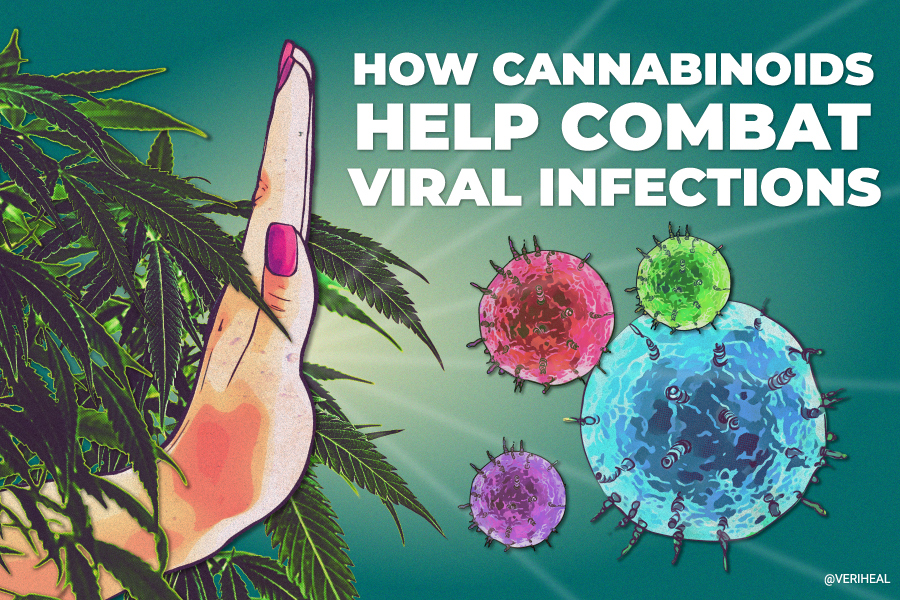From COVID-19 to the common cold to Ebola and even HIV/AIDS and warts, viral infections have been impacting and claiming lives in various forms. As the name would suggest, viral infections stem from viruses that feed off of healthy cells in the body and cannot be cured by antibiotics.
In light of the recent research that suggests that cannabis could help prevent COVID-19, many people have started speculating about the relationship between cannabinoids and viral infections. If cannabinoids indeed hold promise for combatting viral infections, what could that mean for patients suffering from such infections? Let’s find out.
What Are Viral Infections?
Viral infections are described as very tiny germs made up of genetic material inside of a protein coating. Viral infections range from mild to severe depending on which diseases have been caught. These tiny germs are also referred to as “hijackers” since they invade normal living cells to multiply and produce more hijackers. Once these germs have entered your system, they can change, damage, or even kill cells in your body, which is what makes you sick.
Different types of viral infections affect different parts of the body depending on what that specific virus attacks, be it your respiratory system like with the coronavirus or other organs like your liver. Immune systems are responsible for defending your body from these tiny germs, and strong immune systems should be able to fight off the infection before you get sick from it.
Current treatments for viral infections are only used to treat symptoms in order to buy your immune system some time to kill the virus. Vaccinations can help to prevent the invasion that is the viral infection, but there is a drastic need for cures for viral infections.
Viral infections can be transmitted in similar manners to bacterial infections, including but not limited to touching contaminated surfaces, transmitting body fluids, consuming contaminated food or water, and coming in close contact with infected persons. Common viral infections include chickenpox, viral meningitis, viral gastroenteritis, influenza, viral hepatitis, and measles.
A Deep Dive Into Cannabinoids and Viral Infections
Carol Shoshkes Reiss investigated cannabinoids and viral infections way back in 2010 before anyone even knew about the coronavirus of 2019. Reiss explains that cannabinoids may have an influence on cellular and systemic host responses and that the “anti-inflammatory activity of cannabinoids may compromise host inflammatory responses to acute viral infections, but may be beneficial in persistent infections.”
Why You Should Get Your Medical Marijuana Card
Veriheal has satisfied millions of patients nationwide by giving them access to these benefits
- Larger purchase limits
- Peace of mind
- Enhanced legal protection
- Access to higher potency strains
- Save up to 25% on cannabis purchases
- Skip the line at the dispensary
Reiss goes on to explain that neurons are frequently the target of viral infections and that cannabinoids act through the CB1 or CB2 receptors of the endocannabinoid system (ECS), where the CB1 receptors can be found on neurons, some astrocytes, and skeletal muscle cells. Basically, this suggests that cannabis may have an effect on viral infections in terms of acting through the CB1 receptors to target neurons that are frequently targeted by viral infections.
Considering the fact that viruses are parasites and are reliant on the host’s body to multiply, or rather replicate, their tiny germ cells, cannabis may be able to help with viral infections by impairing the virus’s ability to replicate in neurons. Reiss explains that cannabinoids working through the CB1 receptor may inhibit the release of Ca²+, which is significant since many intracellular proteins depend on Ca²+ for activation.
When a virus enters the body, there is a competition between the body’s efforts to contain the virus and the virus’s ability to replicate and spread through the body and then into others. If the speed of replication and spread is able to “out-pace the containment efforts, the host may succumb.” However, if the containment efforts are able to suppress the viral replication, “life-long immunity may result.”
Many people are quick to try and reduce inflammation, which cannabis can be very useful for. But what many don’t know is that some viruses need to be fought with inflammation. Reiss explains that inflammation “is essential for recruitment of both innate and adaptive immune cells to the site of infection to control virus production and limit spread, and then to promote recovery.” This means that the function of inflammation may be impaired if cannabinoids are introduced into the ECS.
So, on the one hand, we have cannabis contributing to the inhibition of virus replication and spread, and on the other hand, there is the fact that cannabis works as an anti-inflammatory agent, which reduces the benefit of inflammation against viral infection. The study associated the benefit of inhibiting virus multiplication and spread with the cannabis interactions with CB1 receptors, but the reduction in inflammation benefits can be attributed to cannabis interactions with the CB2 receptors.
Using Cannabis With a Virus
Reiss notes that recreational cannabis consumption is associated with “generalized infection and very poor immune responses to virus,” which is likely the result of frequent consumption, the higher potency of recreational supply than medical supply, and the consistent suppression of inflammation.
While recreational cannabis consumption does not lead to significant problems for most users, it should be kept in mind that moderation is key and tolerance/consumption breaks should be frequented. Regardless of how cannabis interacts with mechanisms involved with fighting viral infections, it is already well known to reduce the likes of pain, stress, and anxiety as well as improve overall quality of life.
As the research on cannabinoids and viruses becomes better understood, refrain from self-medicating with cannabis. If you do choose to consume cannabis with a viral infection, consider starting with your minimal effective dosage and working your way up. Avoid high-potency products, as they’re likely to interact with your body differently while it’s fighting a viral infection.
Author, Share & Comments
















